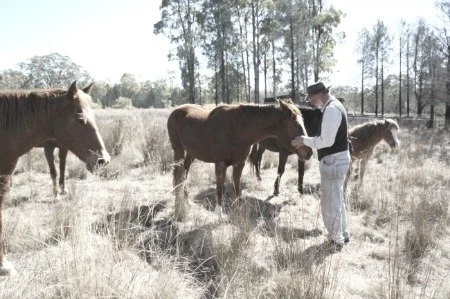Have you ever had horses that don’t get along? What have you done about it?
I’m not just talking about one horse being dominant and top of the herd hierarchy. I’m talking about when one horse bullies a particular horse and is always chasing them away. I’m referring to when one horse ostracises another. Always acting like a big meanie to the junior member.
I was asked recently for my thoughts on what to do about one horse bullying another.
I’ve come across it a few times. Not so much with my horses, but with horses that would come for training and were living in our herd. In my experience, it is usually triggered by stress combined with competition. By that I mean, the stress of coming to a new environment when they arrived for training sometimes precipitated a dominant horses need to assert their authority to feel safe. Then the aggression itself would be set off by the competition between two horses for space, food, friendship, water, shelter, etc. Sometimes, it can be dangerous and horses get hurt.
Being aware that the problem is usually rooted in stress and conflict is important. If we eliminate one of those factors (or both) we can avoid an all-out war between the horses. For example, if competition for food is a factor, then separating the horses at food time helps avoid veterinary bills. But it does not solve the problem. It only dodges it.
The real long-term solution is to turn foes into friends. But how?
Have you ever been stuck in a stressful situation with a stranger? Say you walk into an elevator with a total stranger. Before the elevator gets to your floor it stops between floors. Suddenly you and a stranger are sharing a stressful situation. But in the 45mins before the elevator is moving again you are chatting like old friends, you exchange phone numbers and promise to keep in touch.
When dealing with two feuding horses, I discovered that helping them share a stressful situation can be an effective way of turning a foe into a friend.
What has worked for me several times is to load both horses into a trailer and take them somewhere they have never been before. I’ve made it a 20min trip at least. When we got to our destination, I unloaded the horses and lead them around together to explore the scary new place. I would often do a little groundwork, a little grazing, and a little grooming with both horses at the same time. I would try to use the time as a bonding experience between all of us. After half an hour or so had passed, the horses would be loaded up and we would go back home. Most times the transformation in their relationship was remarkable, but occasionally it required a second excursion in the trailer.
My theory is that sharing a stressful experience changed something important in their relationship. I suspect the dependence on each other for security in the face of uncertainty helps to eliminate the competition and conflict factors that stimulated the bullying. I’ve found this method to be highly successful with zero failure. But keep in the mind the sample size has been very small (maybe 15 pairs of horses, or less), so it is by no means a definitive study and not proof it works.
I have also tried to effect a change in bullying behaviour by working the two enemies at the same time. I would ride one horse while either ponying or working at liberty, the other. Then I would swap them around. I would do this for no more than a week. I can say there were positive changes, but it was not as clear-cut and dramatic as when I used the trailering method.
I would like to do more work on this topic and obtain a clearer understanding of what was going on with foe vs friend relationships. But since I only teach clinics now, the opportunity to further explore the topic is not very often.
Have you tried different strategies that helped two horses become friends?
Me with some of our horses. Not a lot of bullying or conflict going on here.

